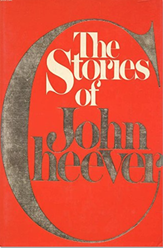Coughing in the theater is not a respiratory ailment. It is a criticism. |
|
FRIDAY: My Book World | Mikita Brottman's Couple Found Slain
0 Comments
My Book World Cheever, John. The Stories of John Cheever. New York: Knopf, 1978. After perusing Cheever’s letters, I felt inspired to read his sixty-one collected stories (almost 700 pages)—a compendium I had previously spurned because I had only read his early stories. Mistake. And I withdraw what I said in print in the past about Cheever’s short stories being of less value than his novels. However, I believe his collection does present an interesting profile. His early ones, indeed, are less developed, less interesting, at least, to me. The middle ones and most of the later ones remain his meatiest stories. Cheever almost exclusively writes about life in New York City and its suburbs (Bullet Park, Shady Oaks). Most of his long list of characters are adorned with Anglo-Saxon (or Anglo-Saxon sounding) names or made-up names of that ilk for symbolic purposes; if he uses a foreign name, he has something in mind (Boulanger, the French housemaid). Among the A-S names: Pommeroy, Westcott, Hartley, Tennyson, Hollis, ad nauseam—all giving voice to his own cultural dna or the heritage of New England. Some of the suburban stories become a bit pat. Most involve a man and a wife, who, to some degree, love one another, but one or the other is unhappy with this happy marriage—three to five loveable but often invisible children. All involve riding trains to the city, driving station wagons over narrow asphalt roads to summer vacations in Maine or the mountains. People who smoke and drink too much and really don’t care. But! These must have been the very stories that the New Yorker wished to publish because Cheever certainly gave them what they wanted. For a time Cheever and family live in Rome, Italy, and it is that experience that gives brilliance to some of his most interesting and creative stories. In his letters, Cheever reveals that their family brings back to the U.S. a young Italian woman who works for the Cheevers. In “Clementina,” he brings this relationship to life by way of fiction, and the result is stunning. Cheever’s suburban world is now seen through the eyes of a poor Italian domestic who both loves and detests what she witnesses in suburbia. Cheever really seems to occupy her point of view. Likewise, “Boy in Rome,” is a lovely wandering story with a wonderful poetic refrain about “being loved enough.” Cheever sees Rome with eyes that have become so jaundiced by suburban America that the story is somehow crisper than some of his domestic narratives. He’s forced to observe and judge more keenly because of the environment’s apparent strangeness. A lesson to all writers: get out of your own backyard if you can, and see what happens to your fiction. Anyone writing short stories could benefit from reading these gems, mostly because it may remove you from your current world, and he shows you how to do it: be a keen observer no matter the setting; write what you know; and have fun skewering human nature if you can. NEXT FRIDAY: My Book World | Mikita Brottman's Couple Found Slain
TOMORROW: My Book World | The Stories of John Cheever
FRIDAY: My Book World | The Stories of John Cheever
FRIDAY: My Book World | The Stories of John Cheever
Sorry! This post should have come out yesterday, but due to a scheduling error on my part it did not happen! My Book World This biography of the author of Moby Dick is all consuming and likable in most respects. Once the reader gets past Melville’s childhood and youth—the fact that his father is poor at handling money and dies in middle age, making it impossible for Herman to earn a formal education—the book becomes more enthralling. Keeping straight the large number of Melville’s siblings, aunts, uncles, and cousins becomes tedious. And anyone looking for exacting truth may be disappointed for whenever author Parker can’t nail down the facts concerning Melville’s early life, he uses language such as “may have been” “could have walked,” “is rumored to have,” “may have borrowed,” “may, before this, have demonstrated,” “a reasonable guess is,” “may not have told,” “may have been referring,” or “31 August is safe enough” (450) to make conjecture. Might Parker have chosen to leave that information out if he wasn’t sure? The chapters and passages concerning the works of Melville—how he researches, how he drafts (his sister is his official copyist), and how he approaches getting published—are entirely engrossing. As a young man of twenty or so, Melville spends more than a year in the South Pacific. From this expedition he mines much material for his first three books: Typee, Omoo, and Mardi. One thing that is difficult to believe is that the American press (with highly opinionated and not always qualified critics) question the veracity of his work. Does he really travel to those places, or does he use resource material to “pad” his work? The British press are kinder to him, but it seems that he is always struggling to pacify the whole lot of them. At the same time, he does attract enough positive attention to continue writing. One must realize that Melville, as well as his friend, Nathaniel Hawthorne, never made much money during their lifetimes. Melville was always begging or borrowing or dealing to keep his family with an income. Would that the poor man had lived to see his place in literary history or to reap the monetary rewards from his brilliant labors! Though it sold barely 3,000 copies in his lifetime, Moby Dick is the novel for which Melville is most remembered. Here, Parker waxes romantic about his subject (and deservedly so): “The river of Melville’s reading had long flowed into his conscious mind (indeed, it had overflowed there in the more bookish parts of Mardi). Now his profounder reading not only flowed on the surface but was partly diverted into a subterranean river that flowed into the spring of original thought, a spring ready to burst out, under the pressure of the occasion and the time, into Moby-Dick, once the interminable voyage was over” (701). Parker’s Volume I concludes with an extended scene in which Melville presents a copy of Moby Dick to Nathaniel Hawthorne so that the man can see that Melville has dedicated the tome to his dear friend and mentor. “Take it all in all, this was the happiest day of Melville’s life” (883). I plan to read Volume II, but I may give it some time!
TOMORROW: My Book World | H. Parker's Herman Melville
FRIDAY: My Book World | Hershel Parker's Herman Melville
FRIDAY: My Book World | Hershel Parker's Herman Melville
My Book World Neruda, Pablo. Residence on Earth. With an introduction by Jim Harrison. Translated by Donald D. Walsh. New York: New Directions, 2004. The translator for this collection, Donald Walsh, in his Translator’s Note, sites critic Amado Alonso who declares: “‘Instead of the traditional procedure, which describes a reality and suggests its poetic sense between the lines, poets like Neruda describe the poetic sense and nebulously suggest to which reality it refers’” (363). Amen. Instead of moving from the concrete to the abstract or allowing metaphors to emanate from the specific, Neruda seems to dwell, in the bulk of his work, on abstractions or impressionistic articulation of ideas, and one can tend to tune out. However, of course, a number of his poems do catch hold of me for their perceptions of human nature, of the nature of power, particularly political power in mostly Spanish-speaking nations. I particularly admired “Burial in the East,” “Single Gentleman,” and “Ode to Federico Garcia Lorca.” “General Franco in Hell” arrested my attention with its quickly shifting imagery, emphasizing in its closure the utter contempt and hatred for fascist, Franco. All in all, not my cup of spiced tea, but I feel better for having read perhaps Neruda’s most notable collection. NEXT FRIDAY: My Book World | TBD
TOMORROW: My Book World | Pablo Neruda's Residence on Earth
FRIDAY: My Book World | Pablo Neruda's Residence on Earth
FRIDAY: My Book World | Pablo Neruda's Residence on Earth
My Book World Raven, Catherine. Fox and I: An Uncommon Friendship. New York: Spiegal and Grau, 2021. A woman lives in a blue steel-roofed house she builds in an area of western U.S. wilderness that is at least thirty minutes from any burg that might be called civilized. With a PhD in biology, the woman lives in her crude dwelling year round and teaches at nearby schools. And she lives alone. Only she isn’t really. She names two cedar trees on her property Gin and Tonic. She names magpies, one of whom, in a strange scenario, will give up her life on behalf . . . well, that’s a spoiler . . . you will want to discover that tale on your own. This woman, the author, is befriended by a fox, a red fox, a species whose adult male weighs no more than six pounds, and must survive, as parable and history tell us, by their wits and cunning. She often reads to Fox (no article, a no-name unlike her other friends) on his mostly daily trips to her property about four in the afternoon. First, she reads to him from St. Ex’s (Antoine Saint-Exupéry’s) The Little Prince. And later, Moby Dick. He seems to be lulled or convinced that she is one of him by the way she does not talk down to him or speak baby talk. He even receives his own sections of the book in which author Raven encourages him to give voice to his point of view (he calls her Hurricane Hands for occasionally extravagant nonverbal communication). Spoiler: Hurricane Hands loses Fox twice, once in the middle of the book when she sees a mangy dead fox, and once at the end (you know it will happen). Here is the magical portrayal of her mistaken conclusion, when, at one twilight, Fox parades his four kits, the ultimate act of trust, in front of the author: “In the middle of all that confusion of kits, one furry orange animal was dancing on a boulder. I don’t ever need to be happier than I was at that moment when I realized Fox was alive. On the hillside where he was dancing, rivulets rained down from a carnelian cliff and flowed through round-stemmed sedges, not so different from a stretch of the Wonderland Trail that I used to cross on my way to Indian Bar. Those subalpine meadows spread out in my minds’ [mind’s?] eye, and I remembered bending down to pull salamanders out of ice-cold brooks. When it was too dark to see Fox, even through binoculars, I sat back in my chair, and imagined him dancing all the way back to his den. I had just learned for certain that one fox was not the same as the rest” (161) Near the end of the book, the author, who has thought so highly of Fox, makes an error by planting a little cactus near her front door where Fox usually lies when he visits. The next time he stops by he says, “Quah,” his one-word vocabulary, holds up his paw, then drops it and catches a toenail on the edge of the plant, casting her a look over his back as he retreats. She transplants the cactus again, and Fox thanks her the next day by lying down. Raven tells us that if we wanted to, we could tame or domesticate foxes within four or five generations. But we shouldn’t. Instead, if each of us were to have such an uncommon friendship with just one non-domesticated animal, the world would be transformed to one where loneliness would become obsolete and the natural world would flourish.
NEXT FRIDAY: My Book World | TBD
TOMORROW: My Book World | Catherine Raven's Fox and I
FRIDAY: My Book World | Catherine Raven's Fox and I
FRIDAY: My Book World | Catherine Raven's Fox and I
|
AUTHOR
Richard Jespers is a writer living in Lubbock, Texas, USA. See my profile at Author Central:
http://amazon.com/author/rjespers Archives
June 2024
Categories
All
Blogroll
Websites
|






















 RSS Feed
RSS Feed